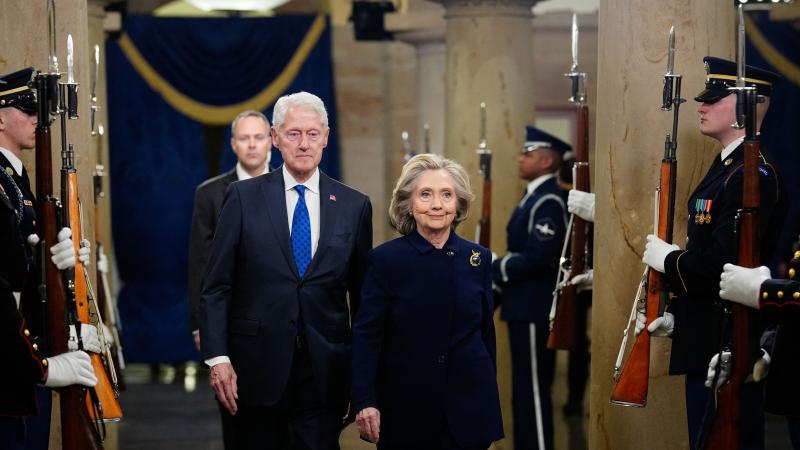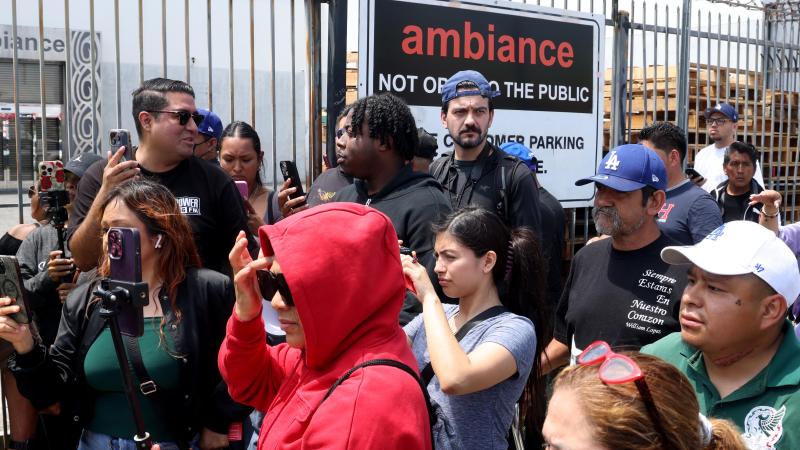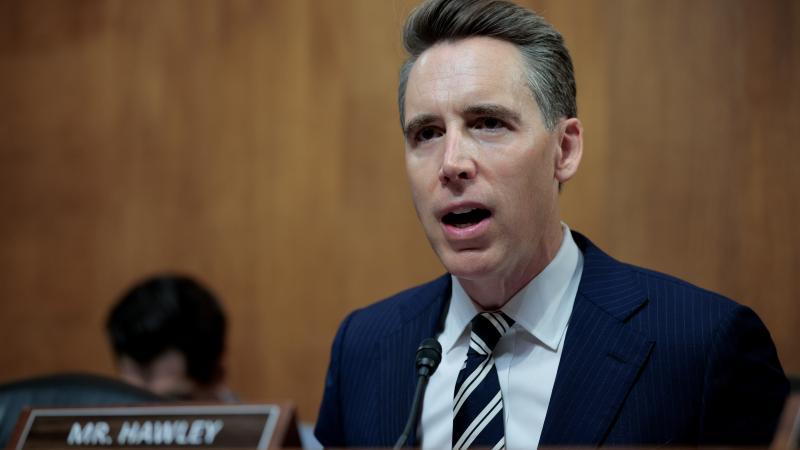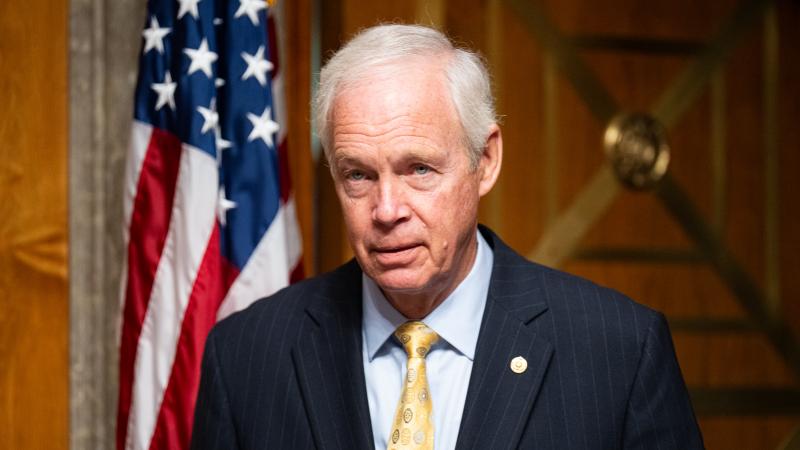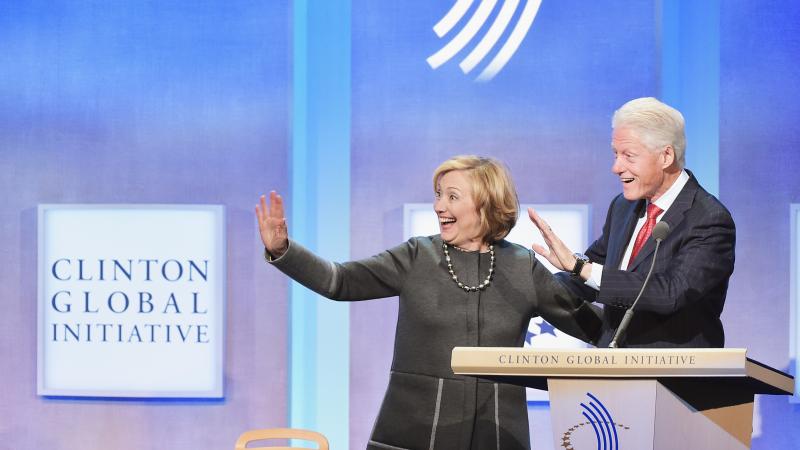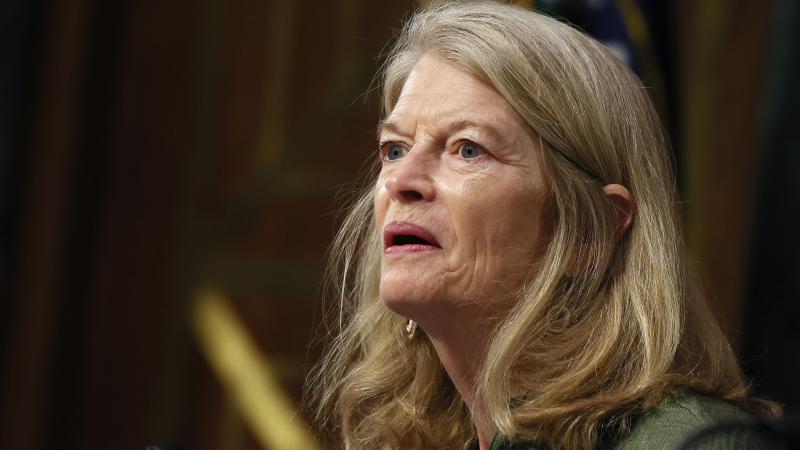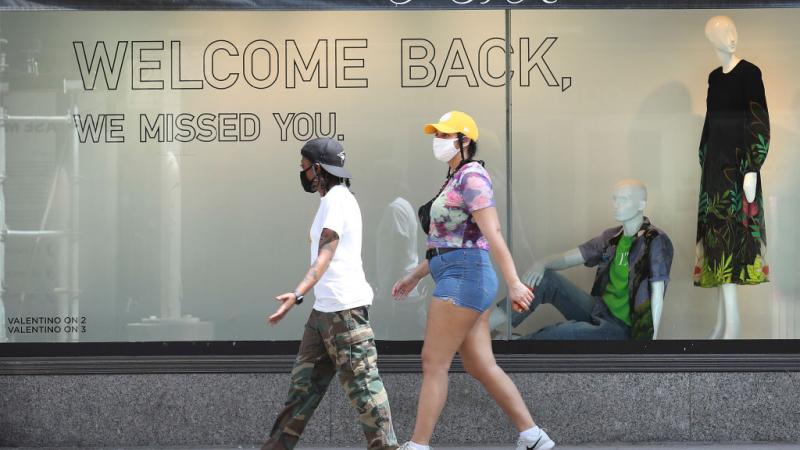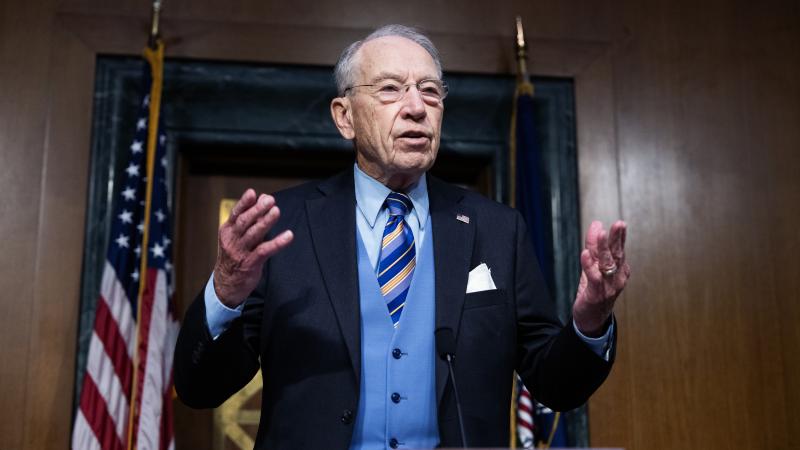Bishop Aubrey Shines on real history of racism
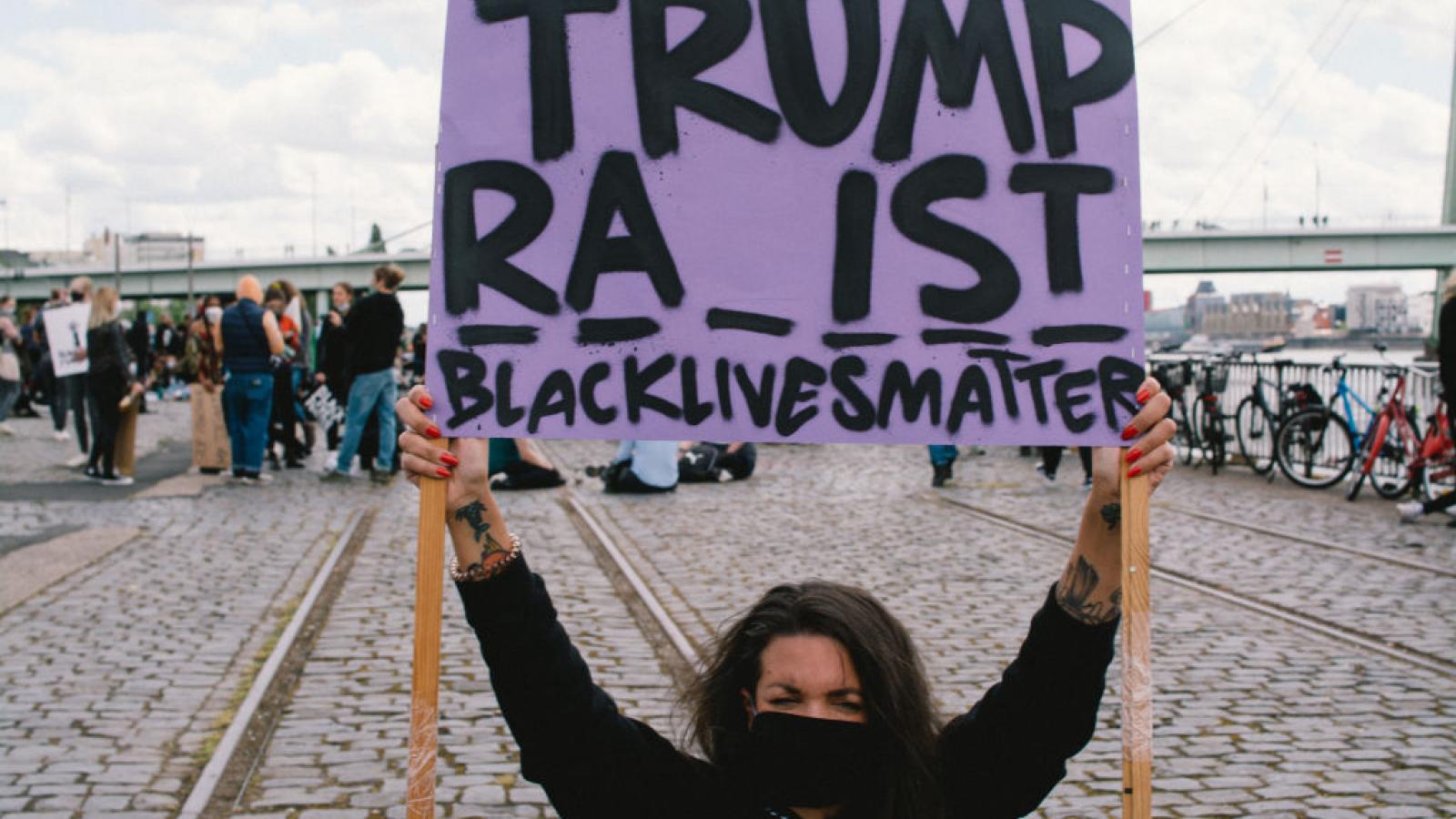
The founder of G2G Ministries says healing the racial divide comes with understanding the Democrats’ treatment of Black Americans
Full transcript:
John Solomon:
Hello, America. And welcome to a new edition of John Solomon Reports, the podcast from Just The News, where today we have some breaking news on the Ukraine scandal, the one that gave us impeachment. And another on the Russia scandal with Bill Barr giving us an outline of the John Durham investigation and where it's headed, a timetable, some expectations, all that. Plus, an exclusive interview with Aubrey Shines.
John Solomon:
The bishop, the Evangelical Christian Bishop, who is one of the most important voices in both the African-American community today and the conservative religious movement. He is an extraordinary man who has a long history of working with people in prisons. He knows the impact of broken families and crime and police and all of the issues at the center of the racial justice debate. He's been there on the front lines because he committed his life to serving God in that capacity.
John Solomon:
He has a lot to say about what's been going on in our country, why we find ourselves at the point that we're at, and how he and many other African-American leaders, many clergy, resent the fact that the media, the left, the Democrats, treat Christians, treat African-Americans as though they're a monolithic bloc, when in fact, they have very different views. He addresses that issue very strongly. You're going to want to listen to this interview.
John Solomon:
It's a great interview, why he supports Donald Trump, what he thinks can be done to heal the racial divide in America, and what may happen in the election this fall. You're not going to want to miss that, Bishop Aubrey Shines, a very eloquent interview up ahead. But first, we're going to go to commercial break. When we come back, we're going to have two big stories, big revelations. One about the Ukraine scandal. The other, about Russia and the Bill Barr-John Durham investigation right after this commercial break.
John Solomon:
All right folks, welcome back from the commercial break. If you like what we do here at JustTheNews.com and John Solomon Reports, the podcast, there's something you can do, and that is support our great sponsors, our great advertisers, they make possible what we do every day in journalism on JustTheNews.com and with these interviews here on John Solomon Reports. They've got great products. They're great people. And they've shown a great commitment to our enterprise. And we hope you can show them the love back.
John Solomon:
And every time you buy something from them, you're supporting our journalism on our product. And so, I thank you in advance for all you do. I know many of you have gone to the store at JTNshop.com and bought products. I know you've ordered from our good friends at UFM Underwear at Omaha Steaks and I thank you from the bottom of my heart. Thank you, thank you for making that possible. All right, two big stories I want to get to quickly. First, exclusive story today on JustTheNews.com.
John Solomon:
And it raises a tantalizing question which is could the whole impeachment scandal have been avoided if Geoffrey Berman, the recently fired US attorney in New York, had simply followed up? And what am I talking about? Well, back in October of 2018, which is long before Rudy Giuliani and the Ukrainian prosecutors got together. Long before I started writing stories about Joe Biden and Ukraine and election interference in Ukraine, there was an approach. An American lawyer named Bud Cummins himself, a former US Attorney in Little Rock during the Bush years.
John Solomon:
He reached out to Geoff Berman, then the US attorney in New York, one of the most prestigious prosecutors in the country. And he let Berman know, both in the phone call and then four emails that the Ukrainian prosecutors specifically, Yuriy Lutsenko, the Prosecutor General of Ukraine, so the Attorney General of Ukraine, had evidence of possible wrongdoing by the Bidens, Joe Biden, Hunter Biden, potential conflicts of interest that he thought didn't violate Ukrainian law but possibly violated or affected American law.
John Solomon:
He wanted to deliver that evidence to Geoff Berman, the US Attorney, the chief federal prosecutor in New York. He also had evidence that US officials may have tried to tamper with or encourage the alteration of a thing called the Black Ledger, the ledger that allegedly showed Paul Manafort's money from Ukraine. He believed that there was some tampering with that evidence. And he wanted to bring that evidence, that testimony, the proof to New York, deliver it to Geoff Berman and his investigative team in the US Attorney's office in New York.
John Solomon:
Long before Lutsenko dealt with Rudy Giuliani, long before Lutsenko did an interview with me laying out these concerns, he tried through a back channel to very quietly deliver this evidence to a federal prosecutor who had jurisdiction. And why did they approach Geoff Berman of all the people they could have approached? Why not call Attorney General Barr or some of the other people and here's why. Here's what happened. The investigation of one of Hunter Biden's business partners, Devon Archer.
John Solomon:
Devon Archer and Hunter Biden were in business together in a company called Rosemont Seneca Bohai. They both served on the Ukrainian Gas Company's board, Burisma Holdings. And they were both together on this Ukraine stuff, while Joe Biden was overseeing US-Ukraine policy for President Obama. Earlier in 2018, Berman's office brought a prosecution against Devon Archer. They secured a successful conviction in a fraud case. Eventually, that conviction got overturned by a judge and it was never retried.
John Solomon:
But because Berman had familiarity with Devin Archer because the money payments from Burisma Holdings were coming in through a New York account, the Ukrainian prosecutors thought that that was the appropriate place to go. Berman had familiarity. He had access to Devon Archer and Hunter Biden's financial records. So, Yuriy Lutsenko, his deputy Konstantin Kulik, tried to get this information to the US Attorney's Office in Washington. They hired Bud Cummins, former Little Rock the US attorney.
John Solomon:
And Cummins had a phone call where he described the evidence. He then had multiple email exchanges where he laid out in very deep, detailed information what Lutsenko was alleging, what the Ukrainian prosecutors believe they had, what their concerns were, what they thought the criminality was. And Geoff Berman did nothing. He didn't follow up. He didn't act on it. He didn't meet with Lutsenko or order some of his people to meet with Lutsenko, at least not as far as Cummins knows.
John Solomon:
And why is that significant? That's what triggered Lutsenko, the Ukrainian Prosecutor General, to eventually approach Rudy Giuliani. And of course, once Rudy Giuliani got involved and the democrats learned about it, it became the scandal that ultimately led to impeachment. So, a profound question is raised by this story. We have the emails. You can read them on the site. If Geoff Berman had done his job, if he had followed up, if he had met with Yuriy Lutsenko or Bud Cummins, would the course of history have been changed?
John Solomon:
Well, Bud Cummins tells me in an interview on the story, he thinks so. He thinks history could have been changed. And now, we know that this US prosecutor who President Trump relieved of his duties this past weekend, didn't follow up, didn't engage. And as a result, Ukrainians resorted to other forms of contact, including Rudy Giuliani, to try to get their concerns made known in America. And that's what ultimately gave us impeachment. It's a profound question to weigh.
John Solomon:
What if Geoff Berman had just simply met with Ukrainians and took their evidence? Well, we'll never know because it didn't happen. But you can read the entire story in the TikTok that's schedule, the time everything that occurred at JustTheNews.com. In that article, it's very important article, I think. And I think you'll learn a lot from it as we delve deeper into the Ukraine scandal. Keep in mind, Senator Ron Johnson, the chairman of the Homeland Security Committee, he has an ongoing investigation of Ukraine.
John Solomon:
And he is going to probably do an interim report this summer. I would expect some new bombshell revelations about the Bidens, about the US Embassy's involvement with Burisma, more contacts perhaps between Hunter Biden, Devon Archer and US officials. And later this week, I may have one of those new revelations about some dealings between Burisma and USAID, the State Department. You'll want to stay tuned for that on Thursday's podcast. Some breaking news will be there.
John Solomon:
Now, let's move a little bit from Ukraine to a neighbor, Russia and the Russia collusion investigations. Over the last few weeks, the Attorney General Bill Barr has given a series of interviews with Catherine Herridge and Maria Bartiromo and the New York Times and several other places. And he has dropped some very, very big hints about what is going on in the Durham investigation, what we can expect both from a timetable and from a revelation standpoint.
John Solomon:
I just want to give you the seven biggest hints I take away from Barr's interviews and statements he's made over the last few weeks. First off, he gave us a timetable, which is Durham has been slowed a little bit by the Coronavirus pandemic, but he expects the first actions, first visible events to occur by the end of summer. But that this probe may stretch beyond Election Day 2020. That's a lot longer than a lot of us thought. But that's the new timetable that Barr has.
John Solomon:
First event to look for later this summer. First developments whether it's an indictment, a report, a criminal information and a plea deal. We'll have to keep an eye on that but Bill Barr is setting the expectation something will happen this summer. That's revelation one. Revelation two, Bill Barr believes that the evidence used by the FBI to justify opening an investigation into the Trump campaign's ties to Moscow was very thin.
John Solomon:
This idea that Alexander Downer had a conversation with George Papadopoulos, Australian diplomat with young Trump campaign advisor, and that that was enough grounds for opening up a counterintelligence investigation targeting the Trump campaign. Bill Barr seems incredibly suspicious. Let me read you this incredible quote. The alleged comments that that Papadopoulos made at a London wine bar to Downer are, "A very slender reed to get law enforcement intelligence agency involved in investigating the campaign of one's political opponent."
John Solomon:
In other words, the Obama administration, the FBI under James Comey and Andrew McCabe, the CIA under John Brennan, they didn't have a whole lot when they opened up this investigation and that makes Bill Barr extremely suspicious. All right, third revelation he's made. One of the things that investigators are focused on is what was going on before the FBI officially opened the crossfire hurricane investigation on July 31, 2016. Barr has said something very profound in the interview of Maria Bartiromo this Sunday.
John Solomon:
He said it's important to find out what was going on between FBI informants and Carter Page and Papadopoulos and Downer and Papadopoulos and a guy named Joseph Mifsud in Europe. All those things predated the FBI having an official investigation. He said, "I understand why it is important to try to determine whether there was any activity before July before the Papadopoulos wine bar conversation. And so, people are looking at that. It's significant." That's Bill Barr's word. It's significant.
John Solomon:
Also, that the dossier, that's the Christopher Steele dossier, was initiated before July. I think Bill Barr is dropping a big hint here, that some of those earlier activities may have some connection to the Christopher Steele dossier and the research project that Fusion GPS and Steele was doing. Let's stay tuned but I thought that was a very big hint that Bill Barr dropped. All right. Here's another one, the fourth big hint. Barr views the FBI's continuation of the Russia probe after the Steele dossier "collapsed" as an illegitimate effort to remove the president.
John Solomon:
In other words, Bill Barr says the evidence he's beginning to see increasingly points to the fact that this was a coup as opposed to a legitimate counterintelligence investigation. He specifically cites the fact that the FBI kept investigating after Christopher Steele's main sub source told the FBI in January 2017 and again in March 2017 that information attributed to him in the Steele dossier was bogus. He didn't say it or he was joking, or he never intended it to be treated as intelligence or criminal information.
John Solomon:
So, here's what Barr says at that point. The dossier pretty much collapsed at that point and yet they continue to use it as a basis for pursuing this counterintelligence investigation. It is the closest we have come to an organized effort to push a president out of office. An organized effort to push a president out of office, that's a pretty big statement by the Attorney General that this investigation had less to do with crimes and intelligence, and more to do with removing a president for office on whatever grounds they could try to come up with.
John Solomon:
All right. Two or three more quick ones. There are multiple criminal investigations into leaks of classified information, including the leak of the Flynn transcript with the Russian ambassador, which as you know, gave rise to potential criminal charges against Michael Flynn. Here's what Bill Barr had to say about that. "Leaking National Defense Information, unauthorized disclosure, that information is a felony. We have a lot of leak investigations underway." Now, Barr also cautions that trying to solve and prove leaks is a tricky process.
John Solomon:
So, they'll only bring cases if they have irrefutable proof. But it's important to note that Bill Barr says there are multiple investing of leaking going on, and that those leaks are likely felonious, and now they need to figure out who committed them. All right. Two more big revelations and then we'll be done. Barr is concerned by the outgoing Obama administration's extensive unmasking of Americans' conversations. All of this occurred at the end of the Obama administration.
John Solomon:
Remember, there were three dozen Obama officials that tried to unmask Mike Flynn calls alone. There were other unmasking of other Trump figures. Here's what Bill Barr had to say. "It makes you wonder what they were doing. It's unusual for an outgoing administration, high level officials, to be unmasking very much in the day they're preparing to leave office." In other words, Bill Barr is suggesting they may not have had a legitimate intelligence reason to be looking at those transcripts.
John Solomon:
Maybe they were spying or are looking with period interest on the incoming Trump administration. Now, he's taking action to back that up. He's named a US attorney from Texas to assist John Durham to look at the unmasking to see if there are any illegalities. But also, Barr said, "This investigation will stop before it gets to Biden. And Obama right now, there's no evidence that they did anything criminal. So, they are not targets." So, President Obama, Vice President Biden, not targets of the unmasking investigation.
John Solomon:
But some of the other people who did unmask, they're being looked at now and they'll determine if anything illegal was going on. All right, finally. The seventh big hint that Bill Barr gave us in the last month of interviews is this. The army's examining whether political pressure was applied. We've talked about this on this very show, whether political pressure was applied to the intelligence community's assessment, the ICA that came to the conclusion that Russia not only meddled in the election, but that it was trying to help Donald Trump win the election.
John Solomon:
Now, when it came out, there didn't seem to be any dissent about that finding. But we've learned since then that there were intelligence analysts, and there is even the NSA, that didn't have as much confidence as Clapper and Brennan and Comey didn't have in this. And at that, now, there's evidence out there that actually contradicts or conflicts with that conclusion. For instance, the CIA knew that the Russians were feeding derogatory disinformation to Hillary Clinton about Donald Trump.
John Solomon:
If you're trying to help Donald Trump win, why would you give dirt on Donald Trump even foster to Clinton's campaign to spread at the end of the election that cuts against the conclusion? Well, Bill Barr has told us that Durham is investigating whether pressure was applied, whether any irregular things were going on as the Obama administration rushed to get the ICA out before they left office. It was one of the ways they dirtied up Trump at the beginning of his presidency.
John Solomon:
And now, we know from declassified documents and experts, people like the former Moscow CIA station Chief Daniel Hoffman, who have said, "I think that part of the assessments wrong. It doesn't match the evidence. It doesn't match Putin's tactics." Well, now Bill Barr is going to get to the bottom of that. All right. So, those are the seven biggest hints that Bill Barr dropped in these interviews he's done over the last few weeks.
John Solomon:
If you want to read more on this, go to JustTheNews.com and take a look at this story. You can also read the Ukraine story, the story about Geoff Berman and you'll learn a lot. There's a lot of documents that have links, a lot of information and quotes that you can read from. All right, when we come back from commercial break, Aubrey Shines the bishop is joining us. One of the most influential voices in the African American community and the conservative movement.
John Solomon:
He's got a new group that is out there fighting censorship and stereotypes and bias against conservatives. You're going to want to hear every word that Bishop Aubrey Shines shares with us. We'll have him right after the commercial break. All right folks, welcome back from the commercial break. And as promised, a very special guest today, Pastor Aubrey Shines, one of the most important voices in the African-American community today. Pastor Shines, thank you for joining us.
Aubrey Shines:
John, always great being with you guys. And really looking forward to this moment here.
John Solomon:
Same here. There's so much to talk about with all that's going on in the world. First, you have such an amazing biography starting with your prison ministry when you were younger and then becoming a pastor of a church and then a bishop of a larger church. I wonder if you could, for our listeners, just give us a sense of some of the things you've done in your career.
Aubrey Shines:
Boy, that's really hard. It will sound like everything I was taught not to do and that is celebrate myself. So, I'll take a stab at it from this direction. I think the success, John, that we have really, really have has really been a real collaborative effort with others that don't, first of all, see ourselves as a specific ethnic group. Those of us who have a Judaeo-Christian ethnos, we see ourselves as first, our belief, second, as Americans. And then third, way, way down the list is the ethnic difference.
Aubrey Shines:
And so, what we've tried to do is just reflect the greatness, not just of a God that we serve, but of a great nation that we believe was founded by some real great individuals. Again, with whatever hiccups they may have had along the way, one thing is for sure, what we look at constantly, and that is America is trying to be mimicked everywhere. So, it lets us know how really special of a grace that we have upon us. And the body of work that I've been able to do for a couple decades, I can only hope, honestly, it really reflects that.
John Solomon:
Now, as when you began your career as a minister, you worked in the prisons. And so, so much today is about social justice and the conversation about that. What experiences did you have? What did you learn from the time ministering to prisoners?
Aubrey Shines:
I found something to be very interesting, and that was that over 87% of all the prisoners did not have father figures in their life. And that scenario for me was a real turning point. Because one would have to wonder, some of these guys were incredibly brilliant. These were not the way that perhaps media would make you think of them. Some of these guys really had potential just beyond one's imagination.
Aubrey Shines:
But when we would do the research, what we would find was that, again, 80 upper percent of all these guys didn't have a father figure, there was no correction. There was no dads that was in the home to go, for instance, to a baseball or football game or to encourage them with something academically, perhaps, they were doing in school. And as a result, the streets became their father, games became their father. Bad influences in father figures became their father.
Aubrey Shines:
And we knew right then and there, like the whole Monahan Project, where he said, "Look, less we begin to really address this issue, what's going on in America, this is going to be an explosion that's going to happen later." That penal system experience really, really took us to a place that we realized we must make a difference. And certainly, what we were seeing being reflective in politics wasn't doing it because they were in essence, keeping these individuals with a mindset that they're victims.
Aubrey Shines:
And they're always going to be victims and they're always going to need someone to come and rescue them. John, I just don't believe that narrative. I just think we could have done better and should do better. And as a result of it, this is why the body of work reflects trying to get information out to say, "Look, follow these prescriptions in life, and you'll have actually a very successful life regardless of one's skin color."
John Solomon:
It's remarkable. I remember many years ago when I was a young AP reporter, I got a chance to interview Chuck Colson and he said something very similar which is the only uniformity he found in people whose lives fell into a life of crime was that lack of a formative family, that lack of a father figure. And yet, when you talk to our public policy makers today, that's hardly ever discussed. We talk about lots of other things, but not the core experience of what happened as a child and the lack of a father figure, lack of a family around them. Why is that and how do we change that?
Aubrey Shines:
We have to talk about it. I was reminded and I was thinking about this while you were saying Chuck Colson. Honestly, one of my favorite people of all time. I just love the body of work. I even have a few buddies to this day that are still working with his organization even though he is physically no longer with us. I found it interesting and find it interesting for a different reason. It's because it has a Judaeo-Christian narrative. Take a debt out of the home environment.
Aubrey Shines:
What you will have, 80 plus percent of those kids, I don't care who they are, by the way, black or white, but more unfortunately impacts the black community. Take that debt out of the home, 80% of those kids are going to not finish high school. 79%, a little over 79%, they're going to repeat the same cycle. And here's the unfortunate part. They're going to actually find themselves not just repeating the cycle in their life but any children that they bear is going to do the same.
Aubrey Shines:
Now, when you compare the difference, and you think about one of the most, in my opinion at least, difficult times in America, especially for blacks was post-Civil War. Look at the numbers. People don't realize it. It's staggering. The black man was still in his home taking care of his children. Do you realize that when you look at those numbers that they were educated in spite of all of the Jim Crow laws and everything that accompany that these individuals stayed intact, they did not have children out of wedlock.
Aubrey Shines:
And as a result, the nucleus of that family in the most crucial time in America, they were still able, John, to move forward. So, now, when you look at, and you juxtapose that, with what I call the current race faders, whether they are the Jesse Jackson's or the Al Sharpton's or the mainstream media, because they all fit the narrative. It reminds me of something that the late Booker T. Washington said and I hope I can still quote it. I did for so many years.
Aubrey Shines:
But he said, there's a certain class of race problem solvers who don't want the patient to ever get well. Why? Because as long as the disease holds out, they also will have not only easy means of making a living, but also an easy medium through which to make themselves prominent before the public. And I often think of Booker T. Washington in that regard, looking at the current status of the information that's being said. And here is the problem, John, that we're seeing over and over again. John, we can do better.
John Solomon:
Yeah, it's a remarkable dynamic of how the conversation on this has evolved over time. And also, there's an entire cottage industry that basically lives off the continuation of racial strife and tensions between the police department and their communities. On that subject, as you look out over the last few weeks with the tragic death of George Floyd, what do you see in the police community relations? Have things gotten worse? Have they gotten better? Are these protests through frustration in the community level or brought in by external sources?
Aubrey Shines:
Well, it's external. Because again, numbers, we can all have an opinion, but science just doesn't lie when you have mathematical equations that one can look at. I think it is very difficult for any of us if we're intellectually honest to admit that if nine blacks, unarmed in 2019, were taken down by police officers, okay, a tragedy, we get it. But when you look at those numbers, those officers have all faced jail time. But at the same time, you have 20 plus white, same scenario that are taken down.
Aubrey Shines:
So, if we're going to say, in case in point, that the police, there's this systemic racism that happens, the numbers just don't add up. When you have officers that are sworn to protect us, doesn't mean you're going to have great people all the time, no more than any other profession. But if we're going to be intellectually honest in this country, George Floyd's death, horrible. And those guys, through due process, will meet their fate.
Aubrey Shines:
But again, to ascribe this a notion that, oh my God, there is this a systemic thing that's going on with police, well, if that is true, which by the way, statistically, it is not true. If it is true, then what do we account for when just this last weekend that just passed in our country, a city I'm very familiar with, I went to high school there, went to college there, the city of Chicago has just experienced almost over a dozen death, 80 plus people shot not by white officers, by the way.
Aubrey Shines:
97% blacks doing that to blacks with the riots. Where's the looting for that? Where's the looting that in the last eight years that we have seen several thousand blacks killed, just in Chicago, no other city alone, we could talk about that. But no other city other than Chicago, more people killed in Chicago in the last 10 years than in all of Iraq war. Where's the looting? Where's the protest? Where's the mainstream media?
John Solomon:
Amazing statistic to think that.
Aubrey Shines:
It's amazing, isn't it?
John Solomon:
Unbelievable carnage, and yet there's a general silence here, right? It's almost become accepted that Chicago is just going to have this violence all the time. It must be frustrating to live there and to be subject to such terrible fare.
Aubrey Shines:
Well, not only that, John, I go further. It must be because I still have family and I have friends that are there. Here's the reality. They don't hear about it in the mainstream media news. And again, I'm not picking on any news in particular, but you don't hear about this on CNN, you don't hear about it on MSNBC or NBC. It's never brief in that regard. And if it is, it's a snippet. And that's it. So, when I see these pontificators out there, talking about how horrible the police are from the mainstream media, it's sad, because it's not a reality.
Aubrey Shines:
And again, you can't take a or several incidents and then paint the entire men and women that serve our communities. And by the way, what would happen, and we already have the numbers, if those officers were not serving the poorest of our black and white communities in this nation? You're talking about pure anarchism that's going on. And so, when I hear this false narrative, it's really is disheartening. It's unfair to the men and women that do serve our communities.
Aubrey Shines:
And more importantly, and just as important, we're not seeing a fair reporting, as it relates to the violence that's really going on in America, especially black and Latinos that are residents of this country. And so, this is why our group, John, does the work that it does. We are exposing the false narrative of the mainstream media. They are not reporting it, we will and we're going to continue to do so until we see a real turnaround as it relates to fairness in America.
John Solomon:
Well, that's one of the things that I wanted to ask you about. So, you recently created a new group with Reverend McCoy and Reverend Reid and Pastor Vega. And it's had a profound effect already. I've seen you guys quoted in several places already. Talk a little bit about what the group is, what it's doing, and what you hope to accomplish over the next year with the dialogue.
Aubrey Shines:
In a nutshell, what we're doing is we are going to be the conduit, where other guys of color are not in their cities, and this is throughout the United States of America. They're not seeing the news reflective through the lens that they look at every single day. And again, some of us, as a matter of fact, the majority of my group, John, just in all fairness, I happen to shepherd 20 plus different ethnic groups. That's just my reality. And the majority of the guys, girls that I do, they are all conservative.
Aubrey Shines:
They discard that way but just through the process of having dialogue. This is what this group is doing. We're finding literally hundreds and hundreds of other pastors across this nation that are saying. "Wait a minute, the silly stuff that we're seeing on the news, that's not our reality." Here's the problem. They have never had a voice. They've never had an organization to say, "We need someone to speak up for us because the news media outlets shut us down." It has always been the case.
Aubrey Shines:
If we are not on the side of the liberal media, believing what they want us to believe and feeding that narrative, they shut us out. They are afraid to bring us on their networks even though many of us have been on multiple networks in the past. And again, we're able to express but unfortunately, that number of news media outlets are so few and far between. There's not a voice out there that these other pastors and leaders can say, "We don't believe in this identity politics. We don't believe in the liberal narrative that they're trying to force down our throats."
Aubrey Shines:
They've never had an organization to do it. This organization is already doing it. We're seeing it being reflective now, finally, in various parts of the media around the country. Now, again, the mainstream media still doesn't want to pick us up. But they're going to be forced to do so because our numbers continue to swell. And they're not going to be able to overcome the reality that we are making an impact in the nation. That's why we have Conservative Clergy of Color.
Aubrey Shines:
We are doing just that we're shining the light on the false narratives that are out there and saying, "Wait a minute, we're not black. We're not just Spanish. First of all, we happen to be Christian. And we believe in this great nation. We believe in being patriots, as some of our grandparents," as in my case, who died in the war, by the way. And we're saying, "We love America." Can things change? Well, we certainly hope so. But America is still the best place around this globe to live in. Don't believe it.
Aubrey Shines:
Get a passport, travel. You would thank God for this country once you get back to it. That's what Conservative Clergy is doing.
John Solomon:
That's always so true. Whatever you think is wrong with America, the second you set foot off soil here, you get to realize just how amazing America is. And I wish more of our young people would travel abroad and understand just how extraordinary the American experience is because I think we take it for granted too often. When you just talked a little bit about the mainstream media, do you see a trend towards censorship between large social media companies, large mainstream media companies trying to silence voices like your own because they don't fit the narrative that the media has?
Aubrey Shines:
Oh, my God, John, all the time. I've been censored before off of social media, not because I put anything out there vulgar, just some historical facts data. Several of our partners, founders just got out of what they call Facebook Jail just for the last 40 some hours again, not because of vulgarity, not because their language was laced with some expletives, simply because we're pointing out things that they won't talk about. And again, we're seeing this all the time.
Aubrey Shines:
There are very few new stations that will reflect our voices. Case in point, John, one of my founders was just in Atlanta, and very quickly, several thousand people marched in front of CNN's building. I have the footage to prove it. Over several hundred black and white pastors dipped this. Do you know that CNN would not report it? And it was right in front of their door. It was peaceful. No one looted. They were singing, they were holding hands, black and white together.
Aubrey Shines:
One affiliate picked it up in Atlanta. And when they did, they actually demeaned it. This as well 200 pastors with their congregants, that's a lie. There were several hundred with several thousand that marched but the media won't touch it yet. If you look on the other side, it can be 20 to 30 who hate America and they'll get back to back coverage on almost every major news media outlet that there is. And yet guys like us, we're constantly censored.
Aubrey Shines:
We're constantly saying, "Uh-uh (negative), don't even run it." They won't bring us on the show because again, to bring someone educated that can articulate the point know the history, we put fear in these guys, for some reason. They're not interested. And this is why Conservative Clergy of Color, this is why we're going to force the narrative. And we're going to keep doing it until there's some fairness that's going on here in this great country.
John Solomon:
I've heard you talk many times and I've been blessed to interview you in the past. And I know one of the things that you are concerned about is this rise of the thought police, that there's only one set of thoughts allowed in America, one set of thoughts allowed in the mainstream political and media establishment. How did we get to that point? And how do we get out of that point?
Aubrey Shines:
Well, I think it has multi prongs attached to it. We see it in our universities, where there is only liberal expression that's going on. We see it being taught even in our great schools where our kids are being forced to celebrate lifestyles that perhaps doesn't reflect their Judaeo-Christian background. I see it as a shepherd among executives that are part of our ministry, where corporations will have various celebratory experiences throughout the year.
Aubrey Shines:
But you can't celebrate if you're a Christian. You cannot celebrate if you believe in something called traditional marriage. So, they have put a stranglehold on voices that vary. And again, I hate to liken anything to Stalinism and dealing with Hitler, but in all fairness, having a Jewish mother, I think I have the right to say some of the things that I say here, and that's this. They are strangling the voices if they do not reflect what is called a common narrative.
Aubrey Shines:
And when you are forced to do it, then one will assume, if this is the only thing you're hearing in the media, if this is the only thing that you're being taught in our high schools and in our grade schools and on the collegiate level, then you are walking away from that experience thinking and, or assuming, I guess this is the way I'm supposed to think. And so, I have to give it to the left. They've done an incredible job harnessing the voices of our nation. Again, I'm not just saying this to say it.
Aubrey Shines:
This is why groups like Conservative Clergy of Color and others that are trying to make a difference. They're needed. And I can only hope and pray that others in media somewhere would say, "Wait a minute, there has to be a difference here. There has to be a different voice." And if not, I tell you what you'll continue to see, you'll continue to see blacks leave what I call the plantation of the liberal left. And we are looking at those numbers now, even in support of this current president, and we are going to make a difference.
Aubrey Shines:
I hate it, John. When I look at the news, and I hear individuals, for instance, with Trump, say, "And his supporters," and they always subliminally put them as if though they are a bunch of only whites, only people that have a certain ilk. Well, that's not fair, because there were millions that voted for this guy the last time around. And in all fairness to your audience, I traveled for then candidate Trump, several states. I saw blacks and whites together all the time.
Aubrey Shines:
But the media never talked about it. You would have thought it was just only a group of white people that wore a certain type of clothing and only had a certain cadence in their voice. And that's what the media tries to do. They want to paint conservatives as white races that only sound a certain way. Well, maybe I'm a white racism and no one gave me the memo, I don't know. I know this, we're going to change that narrative.
Aubrey Shines:
And with groups like Conservative Clergy, we're going to make this thing happen here because we're just sick and tired of. I'm fed up with it. And I'm willing to do what I've been doing all these years to make sure that the next generation understands that this is America, and you can be free and you can yet be courageous and be brave about it. You don't have to have the narrative told to you. You can believe as your conscience allows you to believe. John, that's why we do the work that we do.
John Solomon:
It seems as though, and you mentioned the extraordinary work that the left has done, and it really is an extraordinary achievement. They took basically a 20-year corporate approach to politics and they invested in universities. They invested in media, they invested in activism. And they gained an upper hand in the dialogue and the public square.
John Solomon:
Is it incumbent now upon conservatives to build the alternative infrastructure that that people like George Soros and others helped build on the left? Is that what is that your mission to build the infrastructure where there's medium, there's pastors and activism, there's university integration and focus on university messaging? Is that where your vision is going?
Aubrey Shines:
Yeah, absolutely. That's our overall objective. Because if we have that type of arc that's there, then again, we can give voice, we can give platform, we can give a space where individuals can say, "Look, I really believe this." And again, I think it's really reflective even when we go back in 2016. Think about the polling and all the exit polling that was going on and how Donald Trump was going to lose by this percentage. And I think there was only one real authentic organization that said, "No, actually, he's not going to lose, he's going to win." But you never heard that.
Aubrey Shines:
Well, our group knew that all along. Again, we were part of the narrative. And so, what we're trying to do is create not just what I call ideals, but we're trying to create platforms where individuals can come out and say, "You know what, here's some freedom. And by the way, here's some lawyers that will represent you when you are terminated from your job for speaking up or speaking out." We have a tremendous road ahead of us.
Aubrey Shines:
Make no mistake about it. It's not going to be easy. All the cards are stacked against us. The giants are very large that we're dealing with. But I come from a belief system that I don't care how tall the giant is. Give me just a few stones in my hand. I guarantee you, we will take his head off, we will fight, we will win. And again, we can do this together. Not because one ethnic group or another ethnic group needs it. How about America needs it.
Aubrey Shines:
And I think if we have that as a platform, we can win this thing hands down. We don't have to have a shoe fired over the bow to do it. We can do it through intellect. We can do it through creating those environments. And John, I believe we will win this, just allow us to begin to fight and you'll see victory on the other side of it.
John Solomon:
That's really the key, which is that I think conservatives were caught off guard by the level of infrastructure that the Soros and other determined liberals had created. And now, they're fighting a pitch fight to get caught up. But as the conversation turns, and you've had a profound role just in the last couple of weeks, speaking out on very different subjects and getting some attention. There's some progress already or some evidence that the larger community is beginning to listen.
John Solomon:
We have a story on the site today that notes that a large number of African-American voices across the political spectrum are now speaking out for the first time against defund police movements. So, in just three weeks, we went from everybody thinking, "Well, we're headed towards the defunding crisis with our police." The very prominent people, James Clyburn, the congressman from South Carolina, the sister of Trayvon Martin, several major entertainers, are coming out and saying, "Listen, America without a police is not America at all."
John Solomon:
Do you feel like that those conversations are beginning to happen and that those in the African-American community that have been treated too often as a monolithic bloc, that there's a there's a moment now for the community to speak its mind and create its values and not just be have them defined by the media and political activists?
Aubrey Shines:
Yeah, I do. Because again, they've always treated, especially the black community, as this myopic idea along people or a group of individuals. Well, what is going on in a nutshell, they're being forced to do it because they know, "Wait a minute, this is crazy," because they're listening every day at the news, and they're hearing the Hollywood elitist and others talking about defunding. And I always get tickled at this. And I'll tell you why.
Aubrey Shines:
I've actually counseled, and for ministerial confidential reasons, I can never say who's who, and individuals that I personally counsel. But I know people in Hollywood. And I'm telling you, the voices that are speaking out, saying, "Hey, defund the police," these are people that have private bodyguards. You can't get near them. They have guards with guns, by the way. They're just not big guys around them. These guys are locked and loaded and ready to take you down.
Aubrey Shines:
But it's amazing to us when we hear the Hollywood elitists where we hear the mainstream media really reflecting it because that's what they're doing, they're glorifying it, because they don't allow other voices to begin to say, "This is ridiculous. This is absolutely absurd." What's going on, John, and I can tell you because I'm in these communities. The people are finally saying, "Are you crazy? Have you lost your mind? If you take the police away, who do you call?"
Aubrey Shines:
I mean, what are you going to do? I mean, because the notion was just at least offered here in New York to say, "Hey, you know what, we can call the pastors in and we can call social workers." Wait a minute, you now want us, but you don't want us to have our position on traditional marriage? You don't want us to have our position on whether or not a male is a male and a female is a female, but what are we going to do? Are you going to send us in there with guns blazing?
Aubrey Shines:
I mean, it's so crazy that now men and women that are in these communities are saying, "Have you lost your mind?" No, as a matter of fact, don't defund the police. How about increased the amount of police to stop some of the carnage that we're seeing happen in our inner cities. And this is why they're speaking out. And I'll tell you something else, John. And these are people, by the way, I know this for a fact, these are people that have voted all their life one way and one way only.
Aubrey Shines:
But they're now seeing a different party saying, "Hey, this is dumb." Now, they're saying, "Wait a minute, the party that we've been voting for is the party that's telling us to defund the police department." How about if we look at a different ideological position and begin to vote for people that don't see it the way that the media is telling us to see it? Maybe we should take a look at another party that saying, "No. This is the wrong way to go. We're here to support you. And by the way, we will actually increase the police numbers."
Aubrey Shines:
John, this is why you're seeing this paradigm shift that's going on in America right now. And especially in the black and Hispanic community. We are helping taking the blinders off of their eyes. And I promise you, it's working. It's working.
John Solomon:
One last question. I could talk all day to you. I've just always fascinated by all the work you've done and in your extraordinary history really starting in the prisons where most people would be afraid to go. And you're just a remarkable human being in a remarkable minister of God. But I wanted to ask one last question, going to move out of faith for a second to politics, because you obviously are an unabashed Trump supporter.
John Solomon:
What will it take for President Trump to win? Where are the win reelection? Where are the tactics? What is the coalition building that occurs between now and Election Day that gives him a chance for success?
Aubrey Shines:
I think it's simple. First of all, he's had incredible success with the policies that he has put in place to make sure that not just Black Americans but all Americans are working. I think the fact that he stands on the side of those of us guys that believe in religious liberty, those are things that are working. Those of us who have concerned about things like China and how it impacts negatively our communities when manufacturing jobs, et cetera, are taken away.
Aubrey Shines:
If he keeps espousing those issues, and more importantly, and just as importantly, John, he's got to continue to surround himself when he goes out to these public places, bring in guys, girls, like myself that will stand with him, forcing the media to take a look, even though they probably won't play it. But when those crowds begin to see blacks and whites standing together and clergy standing with this President, I don't take anything for granted.
Aubrey Shines:
My president will win again if that narrative and that message gets out. He's got to keep doing what he's doing, keep talking out against things that are hurting all Americans. And you'll see the DNA, the real DNA America will fight for the cause that is proper. And we'll put this president back in office. He's doing a great job. I 100% unabashedly unequivocally support this president. I love the work that he's doing. I just want him to continue to speak out on these issues. I think he'll do very well.
John Solomon:
Well, there you have it, folks. A prescription directly from Bishop Shines of how the president wins reelection in the fall. Aubrey Shines, thank you so much for the time today. And please know that I know why other media are involved in censorship. You always have a home and are always welcome to come on John Solomon Reports and Just the News were. Been fascinated by your work for years and look forward to talking to you again in the future.
Aubrey Shines:
John, always great being with you. Thanks again for having me. I only wish and hope you guys well.
John Solomon:
Thank you, sir. All right, folks. We'll be back right after this commercial break. All right, folks. That wraps up another edition of John Solomon Reports, the podcast from JustTheNews.com where lots of breaking news has been breaking out all day today. Go to JustTheNews.com to keep abreast of everything going on in our country and in our world.
John Solomon:
New executive actions by President Trump, a missile attack in Saudi Arabia, new developments on the Russia front, all available for you from our great team of reporters that includes Daniel Payne, Christine Dolan, Carrie Sheffield, Nick Ballasy, and many, many more, including David Brody, who today has an exclusive interview with President Trump. You're going to want to see that on the site. We'll be back with you Thursday with a new edition of John Solomon Reports, the podcast.
John Solomon:
Expect me to have a new and exclusive story about Ukraine, Burisma, and the State Department. You're not going to want to miss that. It's a new information I want in a lawsuit, a FOIA lawsuit. We'll be talking about that this coming Thursday. So, please join us again, tune in. In the meantime, go to JustTheNews.com, support our advertisers, keep abreast of the news. Lots of big things happening in Washington and around the world this week. I'm John Solomon. And you're listening John Solomon Reports at JustTheNews.com.

